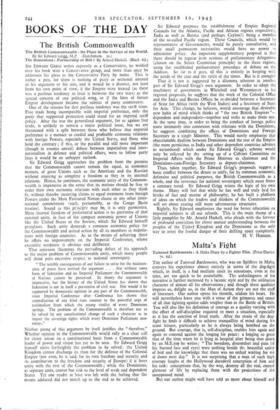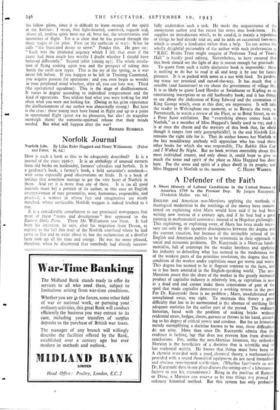Malta's Fight
THE author of Tattered Battlements, who was on Spitfires in Malta, conveys his experience almost entirely in terms of the dog-fight which, in itself, is a bad medium since its sensations, even at the time, are too quick to be assimilable. The unfeelingness of his narrative is further increased by a laconic style and by the utilitarian character of almost all his observations ; and though these qualities impress us, delight us, in the Man of Action they are not the stuff of literature. Our author opens his throttle, seldom his heart. He will nevertheless leave you with a sense of the grimness and ennui of all that fighting against odds tougher than in the Battle of Britain. You will also like his definition- of courage as a quality varying with the effort of self-discipline required to meet a situation, especially as it has the sanction of lived truth. After the strain Of the dog- fight he finds it difficult to achieve tranquillity of mind during his scant leisure, particularly as he is always being bombed on the ground. But courage, that is, self-discipline, enables him again and again to contend against the longing for peace: a longing so great that of the time when he is lying in hospital after being shot, down by an M.E.io9 he writes: " The boredom, discomfort and pain (of his burned face and eyes) were nothing beside the beautiful safety of bed and the knowledge that there was no ordeal waiting for me at dawn next day." It is not surprising that a man of such high courage laughs at the Hollywood daredevil conception of him and his task: conceptions that, by the way, destroy all the real, eternal glamour of life by replacing them with the projections of the unappeased mind.
But our author might well have told us more about himself and his fellow pilots, since it is difficult to learn enough of the spirit of the Service: I mean, that light-hearted, convivial, roguish and, above all, restless spirit born out of, born for, the uncertainties and intensities of flight. Yet it is clear that he has passed through the three stages of the pilot. First (at the outbreak of war): What he calls " the frustrated desire to serve." Ponder this. He goes on : " Such was the irrational urgency which I felt that even if the cause had been much less worthy I doubt whether I should have behaved differently." Second (after joining up): The whole revela- tion of flying coming upon you and the prospect of taking into battle the swift new types. This is the joy of the spring, as it was never felt before. If you happen to be left in Training Command, you acquire passion for operations: and you even begin to wonder in your perplexed mind whether, after all, you can hate war. Third (the operational squadron): This is the stage of disillusionment. It varies in degree according to individual temperament and the kind of operations. You seldom find what you were looking for and often what you were not looking for. (Owing to his grim experience the disillusionment of our author was abnormally strong.) But here is the crux : these young men have found in flight and up to a point in operational flight (great are its pleasures, but alas! its tragedies outweigh them) the romantic-spiritual release that their minds needed. But what will happen after the war?
RICHARD RUMBOLD.



























 Previous page
Previous page